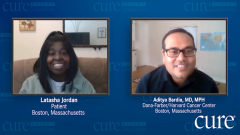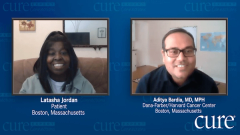
Advice for Future Patients and Caregivers in TNBC
Latasha Jordan and Aditya Bardia, M.D., MPH, share advice for patients and caregivers on the importance of a positive outlook and attitude when living with triple-negative breast cancer.
Episodes in this series

Aditya Bardia, M.D., MPH: Could you mention how you’ve adjusted to life with triple-negative breast cancer? What advice do you have for other patients and caregivers who are going through this experience?
Latasha Jordan: How I adjusted to life? I never didn’t adjust. It really didn’t stop anything. When I had to come in for my treatments or my scans, I just looked at it as a day off. “I’ve got to do this. It’s an appointment. Boom.” It didn’t stop anything. You can’t let it stop anything. You have to go to your appointments. If your oncologist or whoever’s telling you to do something that is going to help you, just do it, and go on about your life. You can’t think about it. You just have to do it. Take your medicine and go ahead. It’s going to be fine, I promise. I’m going through it; I’m still going through it. For however long, I’m going to continue to go through it. I’m not saying that you’re not going to get sad, or you’re not going to think about things. Yes, I do too, but I’m not dwelling on it. I can’t. I have such a full life ahead of me. I got diagnosed when I was 46 years old. I’m 48. I’ll be 49 in July. It didn’t stop me, and you know it’s not going to stop me, Dr. Bardia.
Aditya Bardia, M.D., MPH: Absolutely. Very well said, Latasha. There are three important points in this conversation. The first was the importance of doing what you want to do. Cancer treatment becomes part of your life, but it’s not the only thing. It’s important that you continue to do what you’re interested in doing.
The second is this attitude of moving forward. Looking forward to things and looking forward to things that bring you joy. You feel excited and you want to do things. Yes, you have this additional big baggage of cancer and cancer treatment, but you are still moving forward.
The third is something you’ve brought up multiple times—this positive attitude of taking things and having this positive spirit. It’s clear to see you have a positive attitude based on how you’ve been able to manage everything despite all of the hassles, all of the treatment. First, you had systemic chemotherapy. Then, surgery, and then radiation, and now, a new treatment. And so many transitions. But you’ve handled it very well.
In terms of how, from a medical perspective, things could change in the future, I think there’s a lot of promise with newer antibody-drug conjugates and combination therapies being developed for patients with metastatic disease. And for patients with localized breast cancer, there is promise with immunotherapy. We also have better techniques to detect cancer recurrence. We review blood tests. That’s just one strategy. There is a lot of promise for what we call surveillance, or monitoring, so we can catch cancer earlier, if it were to come back, and intervene earlier. So, a lot of promise is being made and I very much appreciate the partnership, your participation in trials, which is also helping the next generation. The future looks better compared to what we’ve seen in the past. In part, it’s because of research as well as participation of patients or volunteers, as we sometimes say, in clinical trials. So thank you again, Latasha. This was great. I learned a lot. You very nicely highlighted some important principles and fundamental concepts, and I very much enjoyed this discussion.
Latasha Jordan: Thank you. Cancer strong, y’all.
Transcript edited for clarity.





